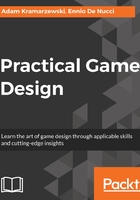
Finding the fun
What do you think about this?
A game where you play as an astronaut who watches Planet Earth being destroyed from a space station?
Or this?
An augmented reality game in which you use your phone to find clues and solve mysteries.
These may sound like good hooks for a game concept (if you think about that first one, that could be a hook for a book or a movie as well), but the most important thing when you are ideating your game is: How can this be fun? What do you do in that game? Is the space station game a survival adventure or a horror? Is it about managing resources or survival? Is it a space shooter? Think about the games you love, what makes them fun? And what is fun anyway? Is it the joy of learning and mastering new systems, of exploring and interacting with the virtual worlds, making interesting choices?
We'll be exploring the connection between fun and game mechanics in further chapters while trying to avoid any unnecessary immersions in the theory. That said, it doesn't mean that you don't have to! There are entire books dedicated to the topic of fun. Raph Kostner's Theory of Fun and Nicole Lazarro's Four Keys to Fun are just two of many noteworthy examples.
Good designers are fluent with practical game design techniques and well informed in the theory. Excellent game designers are experts in both. Fun in games comes from the player experience, which is ultimately related to the core game mechanics. As you can imagine, if those core mechanics are not fun, no one will be interested in the game.
Of course, you cannot wait until the game is finished to try it out and see whether it's fun... So how do you do it?
There's only one answer to this question, and it is by prototyping.